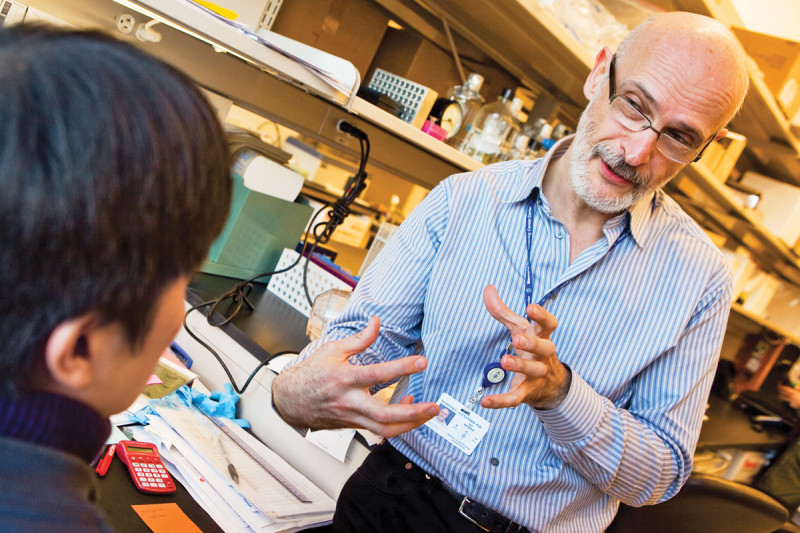
Immunology Program Chair Alexander Rudensky in his laboratory.
Alexander Rudensky is Chair of the Immunology Program in the Sloan Kettering Institute. His laboratory studies the development of white blood cells called T lymphocytes, which play a key role in the immune system’s response to infection. Dr. Rudensky’s own research focuses on a subset of T lymphocytes called regulatory T cells. He recently sat down to speak with us about how harnessing the power of the body’s immune system may help fight cancer.
Our immune system has evolved highly sophisticated ways of fighting infection that hinge on its ability to distinguish between healthy cells and cells harboring intruders such as viruses.
This system provides powerful protection against pathogens, but it comes at a price: Unless the different cell types of the immune system are controlled precisely, they may inflict severe damage on the body’s own cells and tissues.
My laboratory studies T lymphocytes, white blood cells that are vital in the immune system’s response to infection.
One of the areas we focus on is a subset of T lymphocytes called regulatory T cells. We’ve found that regulatory T cells are critical for keeping other white blood cells in check, thereby playing an important role in controlling immune system reactions. In the absence of regulatory T cells, instead of attacking foreign cells, the immune system attacks normal cells and tissues, which may lead to sometimes fatal inflammatory responses.
Understanding how these cells function — what genes and biological pathways underlie their ability to regulate the immune system — has many potential clinical applications. For example, numerous studies have shown that most tumors are infiltrated by regulatory T cells, which are believed to suppress immune responses to cancer. Drugs that act by inhibiting regulatory T cell function might offer new and effective ways to control the disease.
Other potential therapies that act by boosting or targeting these cells are being explored to treat conditions characterized by an overactive immune system — including autoimmune disorders such as rheumatoid arthritis, psoriasis, and diabetes.
Previously, we and others found that a gene called Foxp3 plays a critical role in the generation of regulatory T cells both in and outside of the thymus, a small organ located underneath the breastbone. In a series of recent studies, we reported that a distinct DNA element within the Foxp3 gene is essential for the process by which extrathymic regulatory T cells — those regulatory T cells that are generated outside of the thymus — mature and acquire specialized traits and functions.
In one of our studies, published in the journal Cell in July 2012, we discovered that one unique function of these cells is to control the immune system during pregnancy. Our findings suggest that extrathymic development of regulatory T cells emerged during evolution to prevent a mother’s immune system from attacking the fetus. In mice that lack the aforementioned Foxp3 DNA element, extrathymic regulatory T cells do not develop normally, causing pregnant females to lose their embryos more frequently and develop complications reminiscent of those seen in human pregnancies.
In another study, published in Nature in February 2012, we found that extrathymic regulatory T cells control allergic and asthma-like inflammation in the gut and lungs. My colleagues and I are now exploring whether subsets of regulatory T cells generated in and outside of the thymus play a role in different types of cancer.
We biologists tend to study an organism by breaking it down into parts — essentially attempting to reduce it to a mechanism. And it used to be that immunologists focused largely on specific parts of the immune system, overlooking its entirety and the interactions that take place between the immune, endocrine, and nervous systems. Working with Memorial Sloan Kettering Cancer Center clinicians, we are now starting to apply our knowledge about the ways regulatory T cells control multiple body functions to practical use. Clinicians are trained to treat the entire organism. Their perspective is vital in bringing the scattered parts together.


